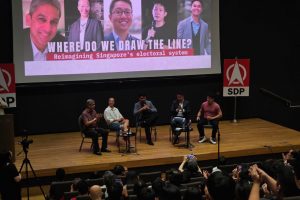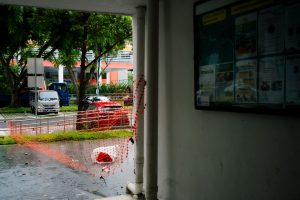All images by Nathan Caleb Koh for RICE Media
Leader of the Opposition and Secretary-General of the Workers’ Party, Mr Pritam Singh, asks the Channel 8 News journalist to refer to his press statement again. He had just announced the resignation of two party members: Mr Leon Perera and Ms Nicole Seah.
The pair—both highly public representatives of the party—admitted they had an affair which stopped shortly after GE2020. Two similar questions had already been asked in the press conference. Both alluded to how the party went about investigating allegations of an affair.
Allegations between the pair first surfaced between late 2020 to 2021. Mr Perera’s personal driver approached Mr Pritam Singh with the allegations of the affair.
“I was informed by Leon’s driver through Whatsapp that Leon and Nicole were meeting very often at restaurants and hotels, and have been seen hugging each other and holding hands,” Mr Singh explains in his press conference on 19 July.
“I asked Leon whether anything was going on between him and Nicole. Leon confirmed that the allegations of the driver were untrue.”
Strange. If you ask a guilty person whether they’ve committed anything wrong, why would they say ‘yes’?
“There was no corroborating evidence to support the allegations that were being made,” Mr Pritam Singh explains.
No evidence until the morning of 17 July, that is. A grainy, shot-on-potato video clip of Mr Perera caressing Ms Seah’s hands emerged online.
Despite the clarifications and answers, internal investigation efforts by the Workers’ Party seem insufficient. An affair is a serious allegation that could tarnish the reputation of the party.
Former politicians have lost their posts over mere accusations. Did the repeated pleas from elderly driver Frankie Wong not hold enough weight against the accused’s denials?
Mr Pritam Singh tells journalists to refer to the statement. But the statement failed to provide evidence that proves, beyond a doubt, that the party did the best they could.
As my colleague Kimberly says: All this could have been avoided.
To Open A Can of Worms
Singaporeans dreading an unsatisfactory answer was the best outcome Mr Singh could have gotten from the scandal. Damage was minimised. Any other option would have been much more damaging to Mr Singh and his party.
Mr Singh’s hands were tied the moment Frankie Wong approached him with allegations. Mr Singh knew that Mr Perera’s personal driver’s services were about to be terminated. There was reason to doubt the credibility of the driver’s claims as nothing more than another disgruntled employee out for his former employer’s blood.
If Mr Pritam Singh approached the driver to hear him out, it would have been Mr Perera’s word against that of Frankie Wong. In other words, a dead end.
The alternative: Convene an independent investigation, which would be akin to opening a can of worms.
If the allegations were found to be untrue, how would Mr Pritam Singh explain his lack of faith to his Parliamentary colleague?
Not to mention the high political cost if media outlets caught wind of the investigation. Based on the homepages of mainstream media outlets over the last couple of weeks, they’d be deploying journalists to sniff out every single detail they can to milk out any semblance of controversy.
Conversely, if Mr Pritam Singh discovered the allegations to be true, he would have found himself in a tricky scenario. He would now have to decide between coming clean to the public, keeping the situation under wraps and informing the public at an opportune time, or praying that it resolves itself.
Hindsight’s Always 20/20
Then there’s always the tried and tested technique: Act blur, live longer.
It works in most situations—you don’t have to address an issue if you weren’t aware of the issue in the first place.
It works when your overbearing sergeant in National Service demands an explanation for that smidge of dust you ‘forgot’ to clean in a crevice you never knew existed. It works when your overzealous boss asks who can work overtime today.
‘Act blur, live longer’ works in politics too.
Of course, this would be the ideal scenario. Commit to an extensive investigation. If the allegations are false, pay for dinner to apologise and slowly regain your colleagues’ goodwill. If they’re true, come clean immediately because the constituents who voted you into office deserve to know.
But hindsight is 20/20. Mr Pritam Singh failed to choose the overall best course of action, but he chose the best one given his dilemma. Some diligence was done, sure, but he bet on the allegations being false. As the man with the hefty title of ‘Leader of Opposition’ on his shoulders, he had to hope for all bases to be covered so everyone could move on.
In the end, those allegations turned out to be true, but the damage remains limited. Far more limited than if Mr Singh was discovered to have withheld this information or swept it under the rug until the jig was up.
He lost the bet. But won the prize of plausible deniability.
A Tale of Two Affairs
Local politics has gotten stranger.
The uncanny coincidence of two separate intra-party extramarital affairs popping up within hours of each other paints a bizarre, degrading image of our politicians across both aisles. It doesn’t matter which way you lean; you have to admit that it’s a concern that needs addressing.
Two political parties. Two extramarital affairs. Four resignations.
Former Speaker of Parliament Tan Chuan Jin and former Tampines GRC Member of Parliament Cheng Li Hui also resigned after admitting to an affair.
In a separate press conference, Prime Minister Lee Hsien Loong revealed that Mr Tan offered his resignation after speaking to him in February.
However, news of the affair only surfaced on July 17 after PM Lee found out that Mr Tan’s relationship continued. That hot mic incident seemed inconsequential in comparison.
“Because in February I had spoken to Mr Tan and I accepted his resignation, I said sort out the succession arrangements in Marine Parade first,” PM Lee explains.
PAP’s approach was different, but unanswered questions similarly linger.
If there weren’t any “information that strongly suggested that the relationship had continued,” would Mr Tan have just left quietly without the public knowing that there was an affair? If fellow MPs faced trouble in filling up Mr Tan’s and Ms Cheng’s vacant spots at short notice, would the party have considered a by-election?
Regardless, PM Lee made a similar political call given the circumstances. While different, both approaches bumped into Singaporeans’ high expectations of transparency.
It’s not for want of trying. When it concerns their colleagues’ character, it’s cruel to expect politicians to forget their past working relationships in the name of ultimate transparency.
While the approaches fell short, their colleagues’ actions did not go unpunished—a privilege we’ve taken for granted as Singaporeans, regardless of political allegiances.
Politics magnifies the flaws of human nature and scrutinises it to death. Perhaps it’s time to accept that actions have been accounted for and move on. Our politicians, contrary to popular belief, are humans too.







